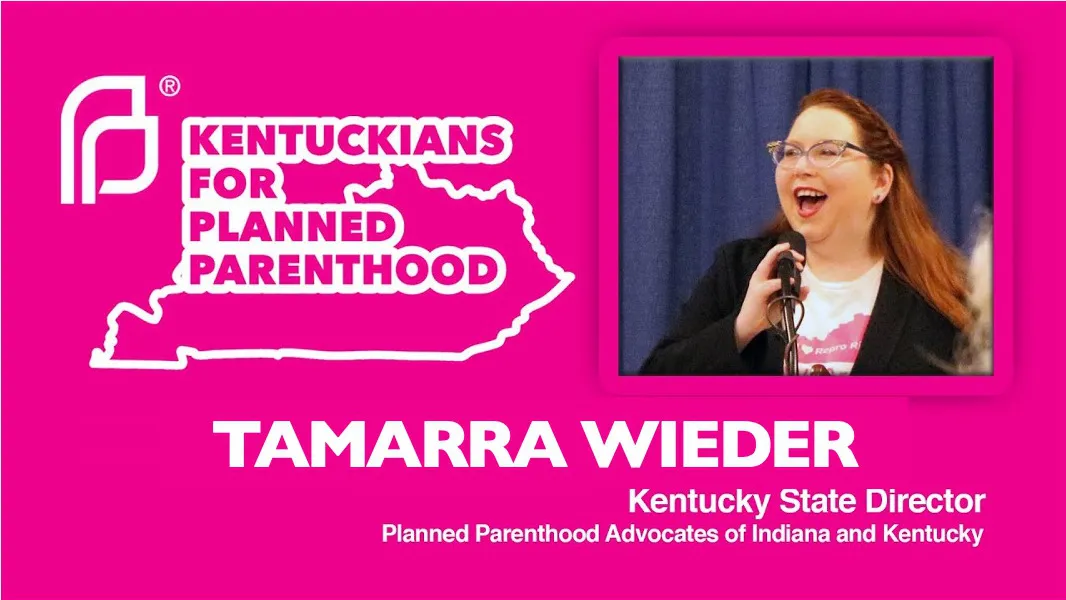Tamarra Wieder, Kentucky State director for Planned Parenthood Alliance Advocates, says she’s relieved that Republican lawmakers didn't push a Texas-type anti-abortion bill through the recent special session of the General Assembly.
"Kentucky was the first state to hold a special session after the Texas ban and we were worried that [abortion] might peek its head in,” said the Louisville-based Wieder. "That being said, [Rep. Joseph] Fischer and [Sen. Whitney] Westerfield have indicated they are looking to bring up one in the General Assembly when it meets in January."
Wieder isn't sure if the two Republican legislators will ultimately draft proposals duplicating the controversial Texas law, which is one of the the country's strictest anti-abortion measures. The law bans almost all abortions.
"If it can happen in Texas, it can happen here," she said. "We don't know if these radical legislators are going to change anything or do an exact copycat."
The General Assembly's next regular session starts in January. The GOP enjoys supermajorities in the House and Senate.
In its regular session earlier this year, the legislature approved the "Kentucky No Right to Abortion in Constitution Amendment," which will go on the ballot in November, 2022. Voters will be asked if they want to change the charter to read, "To protect human life, nothing in this Constitution shall be construed to secure or protect a right to abortion or require the funding of abortion."
Historically, Republicans and conservative Democrats have seen opposition to abortion as a winning issue, especially in mostly Bible Belt, conservative rural Kentucky. "But the data shows that 65 percent of Kentuckians support access to abortion especially in cases of rape, incest, fetal anomaly, or life of the mother," Wieder said.
She believes a pro-choice candidate can get elected, provided the office seeker is exciting, engaging, and authentic, “and doesn't just speak to the talking points."
Meanwhile, it’s already difficult for women to get abortions in Kentucky. In 1970 the state had 17 hospitals and clinics that provided abortion, but by 2019, that number had declined to only one, according to Wieder. Today, there are two: Planned Parenthood and EMW Women’s Surgical Center, both in Louisville.
“Although access hangs by a thread, abortion is still safe and legal in Kentucky, and we must do everything within our power to keep it that way,” said Wieder.
Wieder said the Texas law has awakened Kentuckians to the threat of losing abortion rights. “We’re seeing a lot of energy,” she said. “We are hoping that energy doesn’t turn to apathy.
“The impact of this heinous abortion ban in Texas cannot be overstated. If Roe [v. Wade, the 1972 Supreme Court decision in which a majority of justices ruled that the constitution recognizes a woman's right to terminate a pregnancy] is overturned, Kentucky will go dark due to 'trigger laws.' Abortion will no longer be legal unless we prevail in state court and keep a ban out of our constitution.
"Should the constitutional amendment pass in 2022, it will signal the end to reproductive freedom in Kentucky. The constitutional amendment would mean our last backstop is gone. The courts will not be there to keep Kentucky from going dark."
Wieder finds it ironic that politicians who argue “my body, my choice” in opposing government mask and vaccination mandates to protect citizens against COVID-19 think that the government has the power to restrict a woman’s reproductive rights.“The decision to have an abortion is deeply personal and private. The decision to not wear a mask or vaccinate against something that affects the entire community is vastly different.”
Abortion opponents, many of them religious, liken abortion to murdering babies. But the Bible is silent about terminating pregnancies. “We have a really robust network of pro-choice clergy in Kentucky,” she said, citing the Kentucky Religious Coalition for Reproductive Choice.
“We are pro-choice because our faith,” says the group’s website. “We believe that a woman's right to make reproductive choices is sacred and fundamental to religious freedom.
“….Our purpose is to ensure access to family planning, other reproductive health services (including medically safe abortion), and comprehensive sexuality education. Planning one's family is a fundamental right and a key factor in determining the physical, social, and economic health and well-being of individuals, their families, and their communities.”
Wieder said Planned Parenthood is more than a provider of safe and legal abortions. “We have full-range reproductive health care centers in Louisville and Lexington. A lot of times, we are the first place people have gone for health care in a long time.”
She said doctors at the centers perform cervical operations to remove cancerous tissues. In addition, patients are screened for diabetes, high blood pressure and high cholesterol, and for breast and testicular cancer. “About 20 percent of our patients are men,” Wieder said. “We also promote a healthy home environment by encouraging smoking cessation.”
Clinic staffers also council victims of domestic abuse and violence and refer them to law enforcement and appropriate state agencies.
“Planned Parenthood is a healthcare organization that serves all,” Wieder said. "We must fight city by city, state by state, to ensure that people can still access the health care they need.”
--30--








